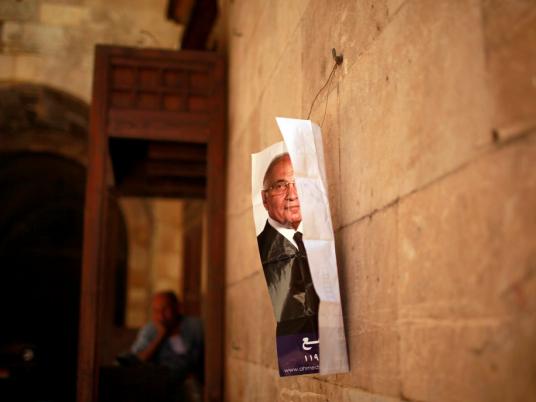Political forces voiced mixed reactions Monday over a set of military-backed draft amendments to the electoral laws that would allow a combination of a single-winner system and party-based proportional representation for the first time in over two decades.
The suggested modifications allocate two-thirds of Egypt’s constituencies to single-winner candidates while the remaining third would be up for grabs to list-based candidacies. Many questions still remain about the specifics, including the number of constituencies and the allocation of seats to each of the two electoral systems.
Unlike previous legislation from the SCAF, this bill was disclosed to the media last week to initiate a public debate before the final law is promulgated. The military has not announced a precise deadline for these informal deliberations. There is no official mechanism that the SCAF will consult on this issue.
Most political forces said that the military-suggested changes fall short of their demands. While some parties insist that individual candidacy be abrogated altogether, new political players and civil society activists hold that a mixed system ensuring more seats for party lists would be optimum.
“This is called patching and this [draft] will not fix the flaws of Egypt’s electoral system,” says Hussein Abdel Razek, leader of the left-wing Tagammu Party. “They still hold on to the individual candidacy system and they just wanted to deceive parties by allocating one third of the seats to the list-based candidacies.”
In single-winner systems, the voter casts a ballot for a specific candidate in her or his district. Yet, in list-based candidacy, voters select a list usually formed by a political party or an alliance of several parties. Eventually, each list is allocated seats according to the number of votes it garners. The latter system is generally praised for its ability to ensure the representation of women along with ethnic and religious minorities.
Under Mubarak’s regime, opposition parties held the single-winner system responsible for electoral irregularities that marred Egypt’s elections. They contended that list-based candidacy would empower political parties, reduce electoral violence, encourage voters to choose their representatives according to their political platform rather than personal ties and eliminate electoral bribes.
Like Tagammu Party, the liberal Wafd party also opposes the dual electoral system proposed by the military.
“You are confusing the voter with two electoral systems,” says Essam Shiha, member of the Wafd’s Supreme Board. “The list-based candidacy is the system that suits democratic transition the most.”
Since the multi-party system was introduced in 1976, Egypt has adopted different electoral systems. In 1976 and 1979 elections, voters casted their ballots for individuals. In 1984, the state relinquished that system and switched to a party list-based candidacy. Under the law, a party that secured less than eight percent of the total votes did not earn representation in parliament. This system did not stay for long as the Supreme Constitutional Court ruled against it, contending that it discriminated against independents.
To conform to the ruling, the 1987 elections were conducted under a mixed electoral system. The government only allowed independents to compete for 48 out of 448 seats. This move allowed opposition lists to secure almost one fourth of parliamentary seats but it did not protect the constitutionality of the new parliament.
Again, the SCC declared the parliament null and void, arguing that it failed to ensure equal opportunities for independents running on individual tickets and party lists. Since then, Mubarak’s regime adopted a single-winner system.
In order not to discriminate against independents, Abdel Razek said the list-based system should not be restricted to political parties. Independents should be granted the right to join party lists or form their own lists, he added. The proposed amendments already grant independents that right.
Some parties, however, think that Egypt cannot rid itself of the single-winner system all at once.
“In principle, we believe that [a mixed system] is the most suitable at this juncture,” Mahmoud Hussein, Muslim Brotherhood Secretary General told Al-Masry Al-Youm. “Yet, the details of the legislation still need to be studied. We need to find out if the ratios suggested are the most appropriate.”
On abolishing the single-winner system, Hussein says: “If we abrogate the single-winner system, we will be denying independents the right to run.”
Even if the list-based system gives independents the right to form their own lists, “we will be discriminating against any Egyptian who is not able to form a list,” he says.
Under Mubarak, the single-winner system allowed the Muslim Brotherhood, which was legally outlawed, to field independent candidates. In post-Mubarak Egypt, the individual candidacy system would no longer be indispensable for the Brothers. Earlier this month, the Muslim Brotherhood’s nascent Freedom and Justice Party applied for official status. Egypt’s oldest Islamist group had announced that it would compete for up to 50 percent of parliamentary seats in the poll slated in September.
The Muslim Brotherhood is not the only group that supports the mixed system. Other non-Islamist parties might end up toeing the same line. Mohamed Fahmi, a co-founder of the would-be Egypt Freedom Party explains that it is too early to relinquish the single-winner system.
“Parties, especially the new ones, are not ready to compete solely under a list-based system. I do not think they are capable of presenting a viable list of candidates who can represent different segments [in society]. This might be possible in five years time,” says Fahmi, who was not speaking on behalf of his party, as it has not yet decided its position.
While condoning the mixed system, Fahmi holds that the percentage of seats allocated to list-based candidacies should be raised. Hafez Abu Saeda, Secretary General of the Egyptian Organization for Human Rights, reiterated the same demand.
Abu Saeda insists that the majority of seats should be allocated to lists rather than individuals. He suggests a mixed system where only 25 percent of seats are allocated to single winners.
“I want to strengthen political parties and an end up with one or several parties that can form the cabinet,” explains Abu Saeda.
The army-sponsored amendments retain the 50 percent quota for workers and farmers in the parliament, a clause in the constitution dating back to the era of President Nasser and reaffirmed in the military’s constitutional declaration from March.
They also stipulate that electoral lists be closed, which means that the voter would not be allowed to change any of the names listed or their ranking order. This rule is applied in some democracies, including Israel and France.
Most European parliamentary democracies allow open lists, which give voters the right to change the arrangement on the list and vote for particular names. According to the SCAF-suggested changes, only closed lists are allowed.
Abu Saeda welcomed the change, explaining that time is too short to apply an open list system. “You will need to train voters for six months or up to a year on how to deal with open lists without ruining his ballots,” said Abu Saeda.
At least 44 million voters are eligible to choose their representatives in the People’s Assembly in September. Although most secular political forces have been demanding the postponement of elections to give enough time to nascent parties to build a solid support base capable of competing with Islamists and remnants of Mubarak’s National Democratic Party, the military repeatedly affirmed that elections would be held on time.
In recent months, different political groups have complained that the SCAF has monopolized the drafting of new laws. This time, they hope that their demands on electoral reform won’t fall on deaf ears.




